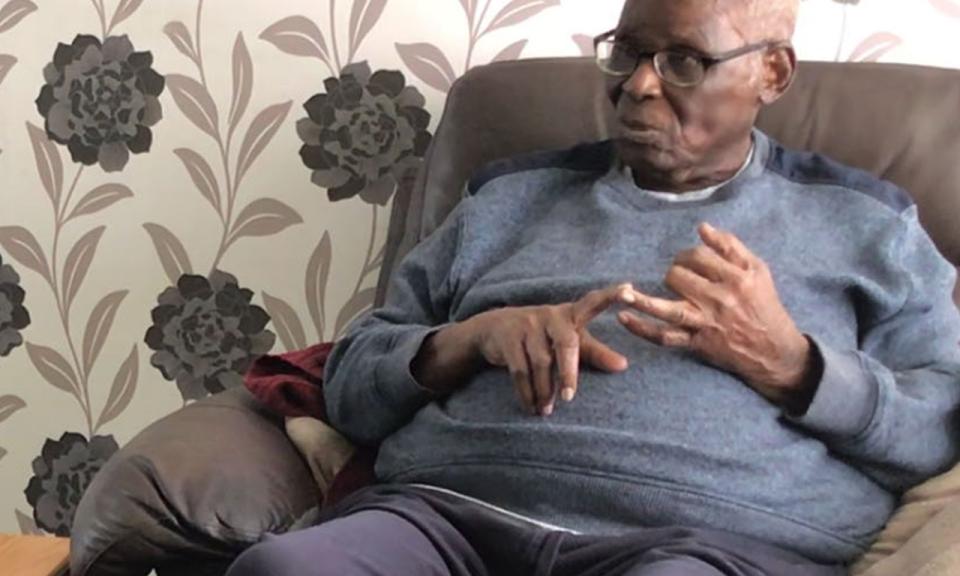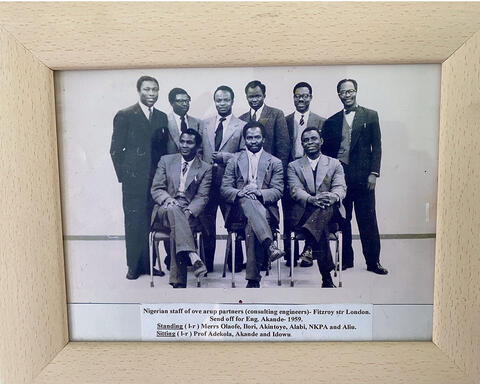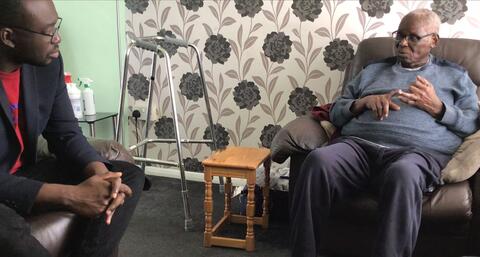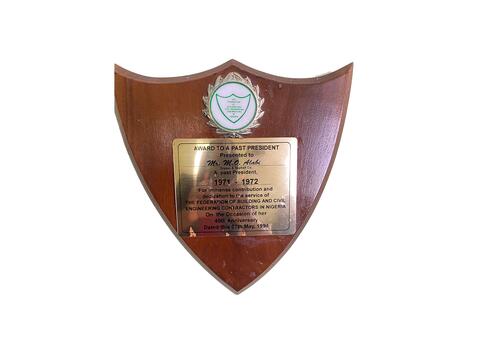
In celebration of Black History Month alumnus Tola Makanjuola (MSc Innovation Entrepreneurship & Management 2014) interviewed his grandfather, one of the engineers who was responsible for the structural design of the expansion of Imperial College London, South Kensington campus in the 1950s.

How did you come to work on the Imperial College project?
I was a student at the Brixton School of Building, part time and on a sandwich programme at Ove Arup Partners Consulting Engineers. It was around this time that they were awarded the Imperial College contract. Incidentally, the engineer I was assigned to, was responsible for the structural design of the building. He did the designing, and I did the detailing. By detailing, I’m referring to where the reinforced concrete and steel should go, to make the building secure.
Michael Oladosu Alabi is pictured here, third from right (standing) with Nigerian staff of Ove Arup Partners 1959
So he did the high level design?
That’s right. He would check my work, and if he was happy with it, he would approve it for union construction. The intricacies of the building required supervision. Unfortunately, most of our boys (Nigerians) didn’t like to go out on site because of the cold weather. Since I was studying building, my belief was you can only be a good builder if you see how it’s done in practice, not just in theory. When the building was about to commence, engineer Vivian Anderson was asked to go to site as the supervising structural engineer, and as the person who helped to detail the drawings, I volunteered to go with him.
We began construction, which started from the basement.
Like the very foundation essentially?
Yes.
Wow. Ok

So, we started. Sometimes I would stand at the site and watch the workmen. I never interfered, but I always watched. Once, however, I did interfere when they were working on a certain section, and it was time for a break. I expected them to finish the section before they went off on their break, and when I asked, they looked at me and responded, “Don’t you know it’s our break time?” Next thing I knew, they called on the union leader, and they all walked out.
*BOTH LAUGH*
Really?
Anderson was in the office (which they both shared on-site), and I went off and informed him of what happened. That was my first experience of the trade union
*BOTH LAUGH AGAIN*
When I learnt that worker’s rights must be respected, I didn’t interfere again.
After we finished the foundation, they used asphalt. I asked what it was for, and they said it was to prevent water from coming into the building from the base. The process is called Asphalt tanking. This was carried out by another team, and I observed this process as well. Asphalt tanking can only be done when the concrete is cured, in other words, dry. Therefore, concreting can’t done when it is raining or snowing. As they began this process, the idea on which my company, DryDec and Asphalt, would be based on, was born.
Incredible
When the structure came up to the ground floor level, we were confident that job was done, because the foundation was made good, and so we left the site.
How did it feel to watch your designs come to life?
The fact that I did that? And that building stands till today? It is a huge source of pride.
So, have you been to Imperial College since you left in the late 50s?
I haven’t.

After my grandfather’s time on the Imperial site, he went on to work on the structural foundation of Crystal Palace’s football stadium. Soon after, he returned to Nigeria with his young family and embarked on a remarkable career that culminated into entrepreneurship.
From 1971 - 72, he became the first indigenous president of The Federation of Building and Civil Engineering Contractors in Nigeria, a position previously held by British expatriates.
Pictured the award Michael received as the past president for immense contribution and dedication to the service to The Federation of Building and Civil Engineering Contractors In Nigeria. Dated 27 May, 1994
My grandfather’s achievements in the British climate of the 50s and 60s seem remarkable considering that, it wasn’t uncommon for a local bed and breakfast in Britain to have a sign that read, “No Dogs, No Irish, No Blacks”. Which makes me wonder, perhaps key attributes such as self confidence, integrity, intelligence, grit, determination, all contributed to this. Just as critical in my assessment, was the grace to never let issues of race cloud his judgement.
As I stroke my obscure beard, I reflect on Britain in 2020 and realise that in every respect, Britain is at a new juncture in its long history, and we are the structural engineers at the site of the construction of a new nation.
Like Michael Oladosu Alabi, who looked past the frivolous issues of his time, and did his part to ensure that the very foundation of Imperial College London “was made good”, we need to look past trivial differences, such as race and cultural differences, and build a society together that can be a collective “source of pride”.
